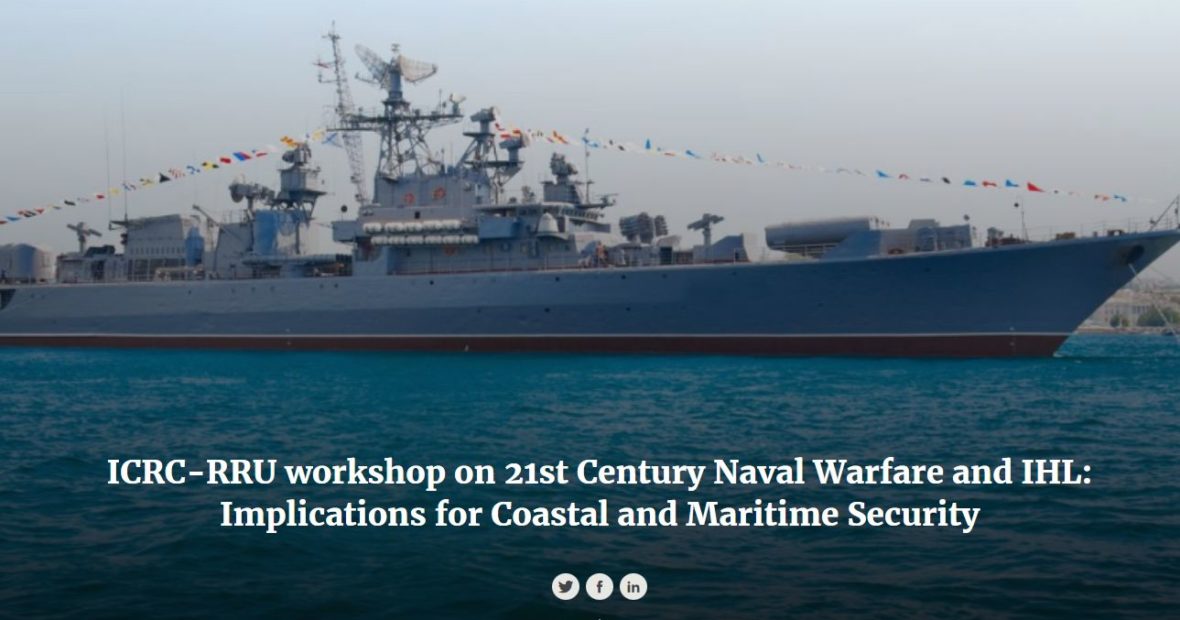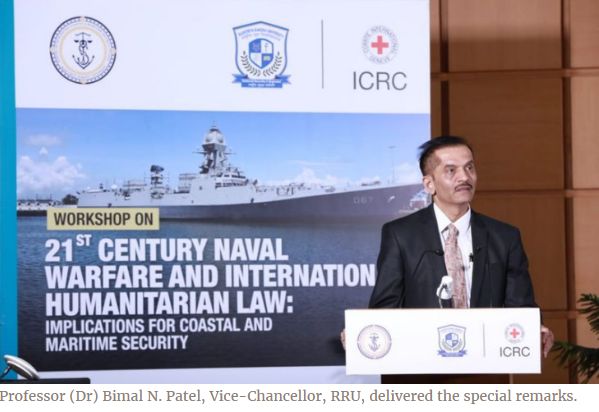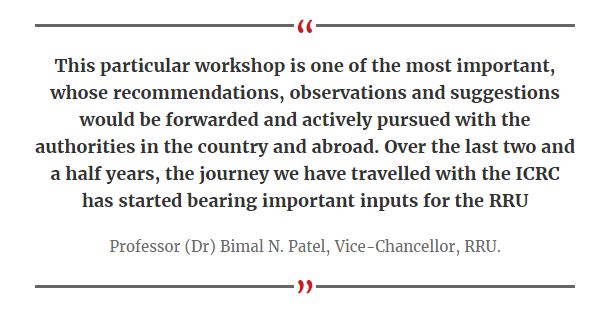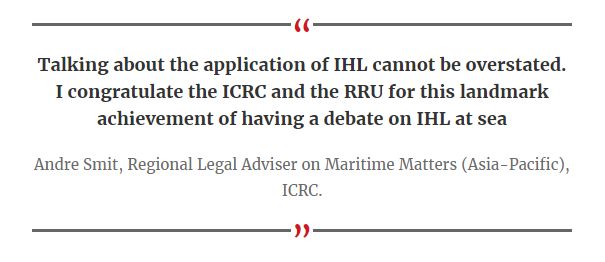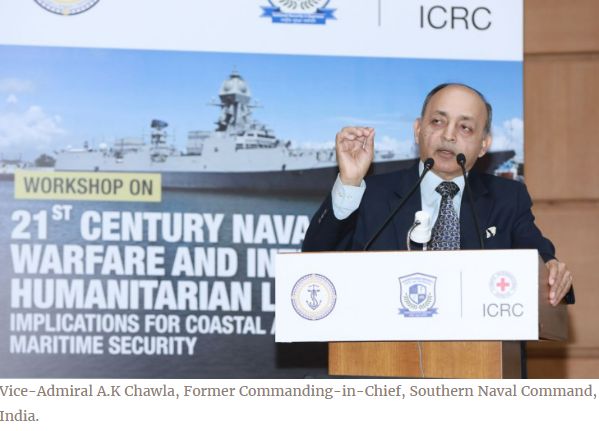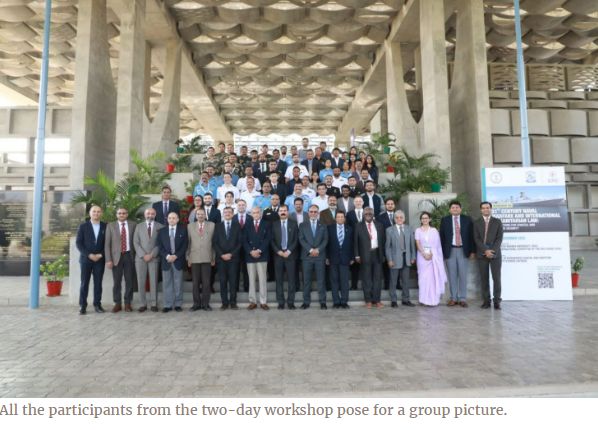The field of warfare at sea has seen several technological advancements, and cyberspace has brought a new dimension to it. With the help of Artificial Intelligence (AI) and Machine Learning, several navies are switching operations from network-centric to autonomous warfare.
Despite the advancements in military technology, the principles of International Humanitarian Law (IHL) at sea remain relevant. Thus, it is imperative that naval strategists and practitioners understand and apply the existing law of armed conflict at sea (LoAC).
Although sea-borne threats and humanitarian challenges continue to endanger regional and global peace and stability, the subject is not given the attention it deserves. Marine environments are also challenged by security issues such as piracy, armed robbery, migration and human trafficking.
In this context, a two-day workshop was organized jointly by the ICRC Regional Delegation in New Delhi and Rashtriya Raksha University (RRU) on ’21st-Century Naval Warfare and International Humanitarian Law: Implications for Coastal and Maritime Security’. The workshop was held on the 7 and 8 December 2022 at the RRU campus in Lavad, Gujarat.
With a particular focus on the Indo-Pacific region, the event created an essential forum for key experts, academics, and interlocutors to discuss matters pertaining to IHL and humanitarian challenges in the maritime domain and to share the state practices in the region.

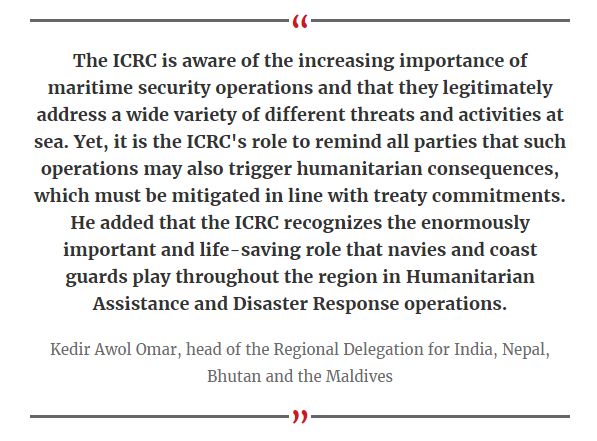 During the two-day workshop, over 100 participants heard from renowned academicians and regional experts from ICRC, as well as panellists and speakers from Japan, Indonesia, and Malta. Among those attending the workshop were officers of the Indian Army, Indian Navy, Indian Coast Guard, Indian Border Security Force (BSF), and Maldivian National Defence Force (MNDF). There was also a high level of participation from former high-ranking military officials and the Indian Government.
During the two-day workshop, over 100 participants heard from renowned academicians and regional experts from ICRC, as well as panellists and speakers from Japan, Indonesia, and Malta. Among those attending the workshop were officers of the Indian Army, Indian Navy, Indian Coast Guard, Indian Border Security Force (BSF), and Maldivian National Defence Force (MNDF). There was also a high level of participation from former high-ranking military officials and the Indian Government.
The Seminar encompassed five substantive sessions, including three with participation by ICRC representatives wherein ICRC regional experts provided institutional position as well as the humanitarian challenges in the maritime domain that received positive feedback and generated meaningful discussion among audience members.
The first day of the workshop included modules on perspectives on 21st-century naval warfare. Challenges to IHL were discussed in today’s changing geopolitical-geostrategic environment and concerning the technological transformations of naval warfare led by Industry 4.0. Subsequent sessions covered underwater warfare, legal considerations, and maritime air operations.
On the second day of the workshop, speakers discussed non-traditional security threats, challenges and legal responses, demonstrating how the challenges have grown in complexity, adding new dimensions to the safety of both humans and maritime law enforcement agencies. The final session covered state practices for naval operations and the San Remo Manual.
The workshop successfully concluded with the valedictory address by Vice Admiral G Ashok Kumar, India’s first National Maritime Security Coordinator. The Admiral, in his address, congratulated the participants for enriching discussions and reminded the relevance of International treaties and existing laws of armed conflict at sea in addressing the 21st-century humanitarian challenges in the Maritime Domain. He further added that the workshop had generated new ideas that can serve as the basis for future research and practical collaborations across countries in the region.
The Rashtriya Raksha University (RRU) in Gujarat — an institution of national importance in India — and the ICRC Regional Delegation in New Delhi signed a Memorandum of Understanding (MoU) in 2020 on academics, research, training, capacity building and extension activities.
Watch the Video


